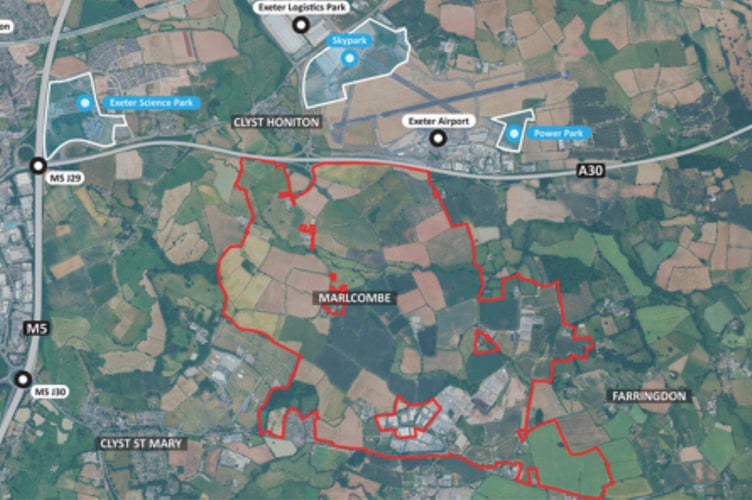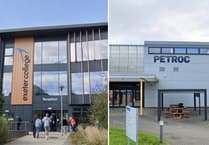A FORTHCOMING new town in East Devon has been included in a national strategy aimed at creating essential new communities across the country.
The proposed new town, which was recently named Marlcombe after a public vote, is hoping to create at least 8,000 new homes, with a bold aim of making 40 per cent of those affordable.
The town is just one of 12 locations included in the government’s New Towns Taskforce report, which received bids from 100 locations.
Senior officials and councillors at East Devon have stressed their desire for essential infrastructure in Marlcombe to come before homes, to ensure the town becomes a genuine community rather than a housing suburb of Exeter.
Inclusion in the report should mean it can secure funding, but also support from government departments, and allow it to prevent developers bringing projects forward without a masterplan being in place.
It should also give it added power to ensure vital infrastructure, such as that linked to water and sewage, is implemented in advance of residents moving in.
East Devon’s most recent new town, Cranbrook, which saw its first residents move in during 2012, had some early successes in terms of infrastructure, such as a school quickly opening, but only got its first supermarket in December last year.
Marlcombe’s inclusion in the government’s New Towns Taskforce report should help ensure it can secure funding to bring forward the likes of road improvements and other infrastructure before homes are occupied.
East Devon will be discussing the creation of a so-called development corporation to oversee Marlcombe’s progress, something it believes will give the council greater control over when certain aspects of the new town are created.
Because Cranbrook was developer-led, progress became more steered by commercial interests.
The government said one reason for its support of Marlcombe was the large number of jobs available at nearby Sowton, adjacent to the site of the proposed town that will lie between the A30 and A3052, immediately south of Exeter Airport.
“At the heart of this economic shift is the Exeter and East Devon Enterprise Zone, a hub for clean growth technologies,” the New Town Taskforce report stated.
“The Enterprise Zone has the potential to create over 10,000 jobs, and generate up to £10 million annually in business rates, with over £100 million already allocated for infrastructure investments.”
Councillor Todd Olive (Liberal Democrat, Rockbeare and Whimple), the cabinet member who oversees infrastructure and strategic planning, said Marlcombe presented the council with a chance to draw on “the valuable lessons learned from the development of Cranbrook”.
“It will not just be a collection of houses, but a vibrant, resilient, and well-connected town that champions innovation and sustainability, with a distinct identity and sense of place,” he said.
“We are determined to see Marlcombe deliver on its potential to create genuinely affordable homes for local people, helping to address the housing crisis, and are pleased that the Taskforce’s recommendations back this ambitious goal.
We are also clear that delivering a well-supported community at Marlcombe will require significant investment in infrastructure, from roads and bus routes to schools and healthcare, and welcome the government’s commitment to working with us and our partners to ensure these are delivered at scale and early in the community’s development.”
East Devon’s leader, Councillor Paul Arnott (Liberal Democrat, Coly Valley), thanked the New Homes Taskforce chair, Sir Michael Lyons, and praised the cross-party working that had helped Marlcombe secure inclusion in the government’s vision.
“I think it is profoundly important in the current overheated political context that credit is given where it is due,” he said.
“I thank the Prime Minister Keir Starmer and his team at the Ministry for Housing, Communities and Local Government for their ambition and for enabling their civil servants to deliver this outcome.
“My administration is Lib Dem-led with Independents and Greens. We have driven the concept of a second new community and will now be delivered with the support of Labour in national government.
“I believe that harmonious cross-party working like this is what the majority of British people want.”
The first phase of Marlcombe is expected to be developed in the 2030s, with around 3,330 homes complete by 2042.
The government pointed to the success of the post-war new towns, which are now home to 2.8 million people. Milton Keynes, initially planned for 250,000 people, is now the third-fastest growing city in the UK over the past decade, has a population of nearly 300,000, and had an economy with a gross value add of £13.3 billion of GDP in 2022.


.jpeg?width=209&height=140&crop=209:145,smart&quality=75)


Comments
This article has no comments yet. Be the first to leave a comment.